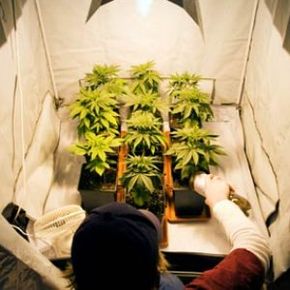Marijuana Usage
People typically use marijuana in one of the following different ways:
- Cigarette -- Dried marijuana buds are rolled into a cigarette, also called a joint.
- Cigar -- Slice open a cigar, remove the tobacco and refill it with marijuana. Often called a blunt.
- Pipe – Tobacco pipes are also used to smoke marijuana.
- Bong -- Water pipes, typically with a long tube rising out of a bowl-shaped base, trap smoke until it's inhaled, raising the amount of THC taken in.
- Food -- Marijuana is sometimes baked into foods, such as brownies, or brewed as tea.
With millions of users, marijuana use isn't limited to one demographic. However, marijuana use is highest among younger people. Marijuana use in teenagers doubled from 1992 to 1999, when one out of every 13 kids aged 12 to 17 was a current user. In 1998, according to the National Center on Addiction and Substance Abuse (NCASA), half of all 13-year-olds said that they could find and purchase marijuana, and 49 percent said that they had first tried marijuana at age 13 or younger.
Advertisement
Since that time, emergency room mentions of marijuana among 12- to 17-year olds have jumped 48 percent, possibly due to the drug's increased potency. In 2004, NCASA reported that children and teens were "3 times likelier to be in treatment for marijuana than for alcohol, and 6 times likelier to be in treatment for marijuana than for all other illegal drugs combined" [source: NCASA]. Following the teenage years, young adults are the most likely demographic to regularly toke up, although the percentage of people who have tried it remains higher among baby boomers and their children [source: Saad].
As of January 2014, 20 U.S. states have decriminalized or legalized marijuana for medical purposes. Colorado and Washington have legalized growing and possessing small amounts of the drug for recreational use, with Florida, New York and other states considering looser laws. Meanwhile, there is evidence of backlash in some counties and towns, which are moving to ban sales within their boundaries, much as some counties are dry [sources: Johnson; Reuters]. In places where possession and/or use remain illegal, the following factors typically affect sentencing.
- Quantity - Penalties vary based on the amount of marijuana found in the person's possession.
- Selling - Penalties are more severe for those intending to sell marijuana.
- Growing - Penalties are also more severe for those cultivating cannabis.
- Location - A person arrested for selling marijuana near a school will often face harsher penalties.
(There's a state-by-state guide to facts about marijuana penalties at NORML.)
Jail sentences and fines have done little to suppress the use of marijuana in the United States. Despite health and legal risks, pot continues to be the illegal drug of choice for many Americans.
Related Articles
More Great Links
Sources
- Cassidy, Christina A. "Efforts to legalize medical marijuana gain traction in the Deep South." Associated Press. Feb. 9, 2014 (Feb. 10, 2014) http://www.startribune.com/lifestyle/health/244622321.html
- Gieringer, Dale and Ed Rosenthal. "Marijuana Medical Handbook: Practical Guide to Therapeutic Uses of Marijuana." Quick American Archives. Oct. 28, 2008. (Jan. 31, 2014) http://books.google.com/books?id=OuAHxDKcpS8C&pg=PA182#v=onepage&q&f=false
- Hall, Wayne and Nadia Solowij. "Adverse Effects of Cannabis." The Lancet. Vol. 352. Page 1611. Nov. 14, 1998. (Jan. 31. 2014) http://www.ncbi.nlm.nih.gov/pubmed/9843121
- Johnson, Kirk. "Cannabis Legal, Localities Begin to Just Say No." The New York Times. Jan. 26, 2014. (Jan. 31, 2014) http://www.nytimes.com/2014/01/27/us/cannabis-legal-localities-begin-to-just-say-no.html
- Kelly, David. "Surge in Children Accidentally Eating Marijuana-Laced Foods." University of Colorado Denver. May 28, 2013. (Feb. 11, 2014) http://www.ucdenver.edu/about/newsroom/newsreleases/Pages/Surge-in-children-accidentally-eating-marijuana-laced-foods.aspx
- Kuhn, Cynthia, Scott Swartzwelder and Wilkie Wilson. "Buzzed: The Straight Facts About the Most Used and Abused Drugs from Alcohol to Ecstasy (Third Edition)." W.W. Norton and Co. 2008. (Feb. 12, 2014) http://goo.gl/cjcGTm
- Marris, Emma. "Not That High." Slate. March 20, 2013. (Jan. 31, 2014) http://www.slate.com/articles/health_and_science/science/2013/03/marijuana_potency_returning_smokers_want_mellower_pot_strains.html
- Maurer, Roy. "Workplace Drug Positives Down Significantly Since 1988 Law." SHRM online. Nov. 25, 2013. (Feb. 11, 2014) http://www.shrm.org/hrdisciplines/safetysecurity/articles/pages/workplace-drug-positives-down.aspx
- Mehmedic, Zlatko, M.Sc.Pharm; Suman Chandra, Ph.D.; Desmond Slade, Ph.D.; Heather Denham, B.A.; Susan Foster, B.A.; Amit S. Patel, Ph.D.; Samir A. Ross, Ph.D.; Ikhlas A. Khan, Ph.D.; and Mahmoud A. ElSohly, Ph.D. "Potency Trends of Delta-9-THC and Other Cannabinoids in Confiscated Cannabis Preparations from 1993 to 2008." Journal of Forensic Sciences. Vol. 55, No. 5. Pages 1209-1217. Sept. 2010. (Feb. 12, 2014) http://home.olemiss.edu/~suman/potancy%20paper%202010.pdf
- National Center on Addiction and Substance Abuse. "CASA* Report Finds More Teens in Treatment for Marijuana than for Alcohol or All Other Illegal Drugs Combined, Huge Increase in Emergency Room Admissions Among 12- To 17-Year Olds Where Marijuana is Implicated." April 20, 2004. (Jan. 31. 2014) http://www.casacolumbia.org/newsroom/press-releases/2004-marijuana-2
- National Institute on Drug Abuse. "How Does Marijuana Use Affect Your Brain and Body?" National Institutes of Health. July 2012. (Jan. 31, 2014) http://www.drugabuse.gov/publications/marijuana-abuse/how-does-marijuana-use-affect-your-brain-body
- Parsche, Franz and Andreas Nerlich. "Presence of Drugs in Different Tissues in an Egyptian Mummy." Fresenius' Journal of Analytical Chemistry. Vol. 352, no. 3-4. Pages 380-384. Jan. 1, 1995. (Feb. 11, 2014) http://link.springer.com/article/10.1007%2FBF00322236#page-1
- Rabin, Roni Caryn. "Legalizing of Marijuana Raises Health Concerns." The New York Times. Jan. 7, 2013. (Jan. 28, 2014) http://well.blogs.nytimes.com/2013/01/07/legalizing-of-marijuana-raises-health-concerns/
- Reuters. Massachusetts "Licenses its First Medical Marijuana Dispensaries." Jan. 31, 2014. (Jan. 31, 2014) http://www.nytimes.com/reuters/2014/01/31/us/31reuters-usa-marijuana-massachusetts.html?ref=marijuana&_r=0
- Saad, Lydia. "In U.S., 38% Have Tried Marijuana, Little Changed Since '80s." Gallup. Aug. 2, 2013. (Jan. 28, 2014) http://www.gallup.com/poll/163835/tried-marijuana-little-changed-80s.aspx
- U.S. Department of Justice, Drug Enforcement Administration. "Drugs of Abuse." 2011 Edition. (Feb. 13, 2013) http://www.justice.gov/dea/pr/multimedia-library/publications/drug_of_abuse.pdf#page=68
- Wilson, Reid. "How Much Does Marijuana Cost in the U.S.?" Washington Post. Jan. 6, 2104. (Jan. 28, 2014) http://www.washingtonpost.com/blogs/govbeat/wp/2014/01/06/how-much-does-marijuana-cost-in-the-u-s/
